Accolades
2017 First Time PIs
Amy Abell (Biology)
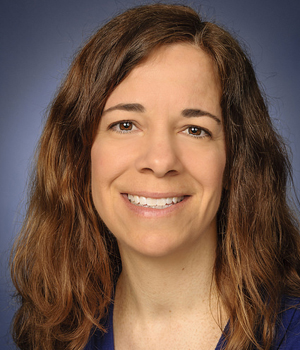 Dr. Amy Abell is an Assistant Professor in the Department of Biological Sciences at
the University of Memphis. She has been awarded a five-year grant from the National
Institutes of Health for $1.35 million to study stem cells. Her work examines a developmental
program that controls the conversion of stationery epithelial stem cells to invasive
mesenchymal cells. Reactivation of this developmental program in cancer cells promotes
cancer metastasis and resistance to therapy, which are the primary causes of death
in cancer patients. Her goal is to identify new genes that control this change and
can be used as biomarkers and druggable targets to detect and treat cancer. By identifying
new targets that regulate the change of epithelial cells into mesenchymal cells, her
work will lead to the development of novel strategies to prevent or reverse metastasis
in cancer.
Dr. Amy Abell is an Assistant Professor in the Department of Biological Sciences at
the University of Memphis. She has been awarded a five-year grant from the National
Institutes of Health for $1.35 million to study stem cells. Her work examines a developmental
program that controls the conversion of stationery epithelial stem cells to invasive
mesenchymal cells. Reactivation of this developmental program in cancer cells promotes
cancer metastasis and resistance to therapy, which are the primary causes of death
in cancer patients. Her goal is to identify new genes that control this change and
can be used as biomarkers and druggable targets to detect and treat cancer. By identifying
new targets that regulate the change of epithelial cells into mesenchymal cells, her
work will lead to the development of novel strategies to prevent or reverse metastasis
in cancer.
Beverly Bond (History)
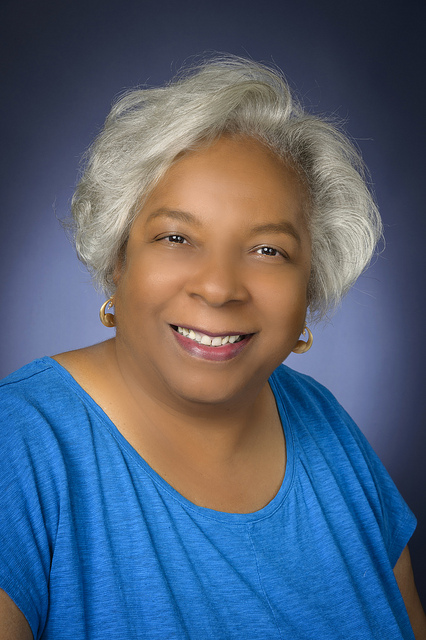 In May 1866, the first large-scale massacre to occur in the post-Civil War South erupted
in Memphis, Tennessee. This tragic instance of racial violence played a key role in
prompting the United States Congress to enact sweeping changes to federal policies,
including the 14th Amendment to the U.S. Constitution. The three-day Memphis Massacre
highlighted the urgency in defining freedom, citizenship, and citizenship rights.
Yet the Memphis Massacre, and indeed much of the history of the national "reconstruction"
that followed the American Civil War, has been erased from the nation's memory. Reconstruction
did not generate the plethora of monuments, museums, and battlefield parks that make
the Civil War one of the most familiar features on our historical landscape. Indeed,
Reconstruction has been deliberately ignored by all but academic scholars. The primary
goal of "Memories of a Massacre: Memphis in 1866" has been to correct this historic
omission. In partnership with and funding from the National Park Service, the Tennessee
Civil War National Heritage Area, Humanities Tennessee, the University of Memphis,
and many other community and academic associates, the Memphis Massacre Project broke
this long-standing silence and launched an enduring conversation about the event,
its legacies, and its meanings, both past and present. Supported events included public
lectures, workshops, book discussions, a website, and an academic symposium.
In May 1866, the first large-scale massacre to occur in the post-Civil War South erupted
in Memphis, Tennessee. This tragic instance of racial violence played a key role in
prompting the United States Congress to enact sweeping changes to federal policies,
including the 14th Amendment to the U.S. Constitution. The three-day Memphis Massacre
highlighted the urgency in defining freedom, citizenship, and citizenship rights.
Yet the Memphis Massacre, and indeed much of the history of the national "reconstruction"
that followed the American Civil War, has been erased from the nation's memory. Reconstruction
did not generate the plethora of monuments, museums, and battlefield parks that make
the Civil War one of the most familiar features on our historical landscape. Indeed,
Reconstruction has been deliberately ignored by all but academic scholars. The primary
goal of "Memories of a Massacre: Memphis in 1866" has been to correct this historic
omission. In partnership with and funding from the National Park Service, the Tennessee
Civil War National Heritage Area, Humanities Tennessee, the University of Memphis,
and many other community and academic associates, the Memphis Massacre Project broke
this long-standing silence and launched an enduring conversation about the event,
its legacies, and its meanings, both past and present. Supported events included public
lectures, workshops, book discussions, a website, and an academic symposium.
Fernanda Botelho (Mathematics)
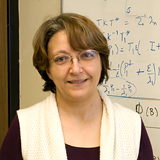 Dr. Botelho's proposal received NSF support to host two mathematical events: 1. a
two-day workshop (October 15-16, 2015) and 2. a conference (April 21-22, 2017), both
held at the University of Memphis. The workshop was timed two days prior to the AMS
sectional meeting held at the UofM. The focus of these conferences were on methods
and advances in operator theory. This was done via a series of expository lectures
on long-standing open problems in operator theory, state-of-the-art techniques and
important recent research contributions to the field. These two events gathered more
than 75 participants and attendees, with a large percentage of graduate students and
young researchers.
Dr. Botelho's proposal received NSF support to host two mathematical events: 1. a
two-day workshop (October 15-16, 2015) and 2. a conference (April 21-22, 2017), both
held at the University of Memphis. The workshop was timed two days prior to the AMS
sectional meeting held at the UofM. The focus of these conferences were on methods
and advances in operator theory. This was done via a series of expository lectures
on long-standing open problems in operator theory, state-of-the-art techniques and
important recent research contributions to the field. These two events gathered more
than 75 participants and attendees, with a large percentage of graduate students and
young researchers.
The main goals of the project were: 1. Dissemination of mainstream trends, state-of-the-art techniques and recent advances in operator theory to a large group of female and underrepresented graduate students and early career mathematicians; 2.Initiation of a social environment among a diverse level of participants for fruitful discussions of mathematical ideas and promising research; and 3. Creation of a supporting network for research collaborations.
Dale Bowman (Mathematics)
 Although multiple demographic, clinical as well as genomic factors have been implicated
in drug-induced liver injury (DILI), the complex interactions of drug properties with
many of these factors, as well as delineation of specific groups of factors that are
most interactive with drugs, are not well-known. The large size of information in
DILI patients' records calls for preliminary analysis to identify potentially meaning
factors for eventual hypotheses testing. In this project, we used topic modeling,
specifically, the Latent Dirichlet allocation (LDA) procedure, as a data mining and
analytic tool to identify groups of these factors that combine to accentuate DILI.
In analogy to the nomenclature of topic modeling in text-mining, we designate patients
as documents and the multifaceted demographic, clinical and genomic information on
each patient as words within document. Borrowing from the tool of liguistic analysis,
we introduce the concept of mutual information of words within topic in order to quantitatively
identify interacting factors within topics. Our work extends the concept of pairwise
mutual information of two words to mutual information score of co-occurrence of many
words thereby providing a quantification of interaction of many factors within topic
in relationship to DILI.
Although multiple demographic, clinical as well as genomic factors have been implicated
in drug-induced liver injury (DILI), the complex interactions of drug properties with
many of these factors, as well as delineation of specific groups of factors that are
most interactive with drugs, are not well-known. The large size of information in
DILI patients' records calls for preliminary analysis to identify potentially meaning
factors for eventual hypotheses testing. In this project, we used topic modeling,
specifically, the Latent Dirichlet allocation (LDA) procedure, as a data mining and
analytic tool to identify groups of these factors that combine to accentuate DILI.
In analogy to the nomenclature of topic modeling in text-mining, we designate patients
as documents and the multifaceted demographic, clinical and genomic information on
each patient as words within document. Borrowing from the tool of liguistic analysis,
we introduce the concept of mutual information of words within topic in order to quantitatively
identify interacting factors within topics. Our work extends the concept of pairwise
mutual information of two words to mutual information score of co-occurrence of many
words thereby providing a quantification of interaction of many factors within topic
in relationship to DILI.
Funded by the Central Arkansas Veterans Hospital, collaborators: Dr. E.O. George from the University of Memphis and Dr. Ayako Suzuki from Duke College of Medicine. This project is ongoing but the funding period ended May 2017. We are preparing an additional VA grant application and an NIH grant application.
Bernie Daigle (Biological Sciences)
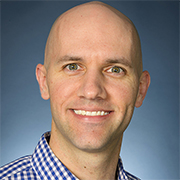 Posttraumatic stress disorder (PTSD) is the fifth most common psychiatric disorder,
with an occurrence rate of approximately 8% in the United States. There is a pressing
need to identify reliable molecular and physiological biomarkers of PTSD for the accurate
diagnosis, prognosis, and treatment of the disorder. In collaboration with the the
Department of Defense-funded Systems Biology of PTSD Consortium, Dr. Bernie Daigle,
Jr. from the Department of Biological Sciences at the University of Memphis is searching
for blood-based biomarkers from DNA, RNA, protein, metabolite, and endocrine measurements.
Dr. Daigle received funding from the US Army Research laboratory under Grant No. W911NF-17-1-0069
to develop and apply novel statistical and machine learning algorithms to these data
in order to more accurately diagnose PTSD in future subjects. Ultimately, Dr. Daigle's
efforts should provide a deeper understanding of the molecular mechanisms underlying
PTSD.
Posttraumatic stress disorder (PTSD) is the fifth most common psychiatric disorder,
with an occurrence rate of approximately 8% in the United States. There is a pressing
need to identify reliable molecular and physiological biomarkers of PTSD for the accurate
diagnosis, prognosis, and treatment of the disorder. In collaboration with the the
Department of Defense-funded Systems Biology of PTSD Consortium, Dr. Bernie Daigle,
Jr. from the Department of Biological Sciences at the University of Memphis is searching
for blood-based biomarkers from DNA, RNA, protein, metabolite, and endocrine measurements.
Dr. Daigle received funding from the US Army Research laboratory under Grant No. W911NF-17-1-0069
to develop and apply novel statistical and machine learning algorithms to these data
in order to more accurately diagnose PTSD in future subjects. Ultimately, Dr. Daigle's
efforts should provide a deeper understanding of the molecular mechanisms underlying
PTSD.
Michael Sances (Political Science)
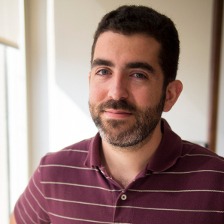 Dr. Sances' project is on the political impacts of the state expansions of Medicaid
that occurred under the Affordable Care Act. This grant runs from Spring 2016 to Spring
2018, and is joint work with Joshua Clinton at Vanderbilt University. We study the
impact of the Medicaid expansions on political participation, as well as the impact
on public opinion toward the Affordable Care Act. We find the expansions increased
voter registration, but had only small and short-term impacts on turnout. We also
find a small increase in approval of the ACA that we attribute to the expansions.
Dr. Sances' project is on the political impacts of the state expansions of Medicaid
that occurred under the Affordable Care Act. This grant runs from Spring 2016 to Spring
2018, and is joint work with Joshua Clinton at Vanderbilt University. We study the
impact of the Medicaid expansions on political participation, as well as the impact
on public opinion toward the Affordable Care Act. We find the expansions increased
voter registration, but had only small and short-term impacts on turnout. We also
find a small increase in approval of the ACA that we attribute to the expansions.
